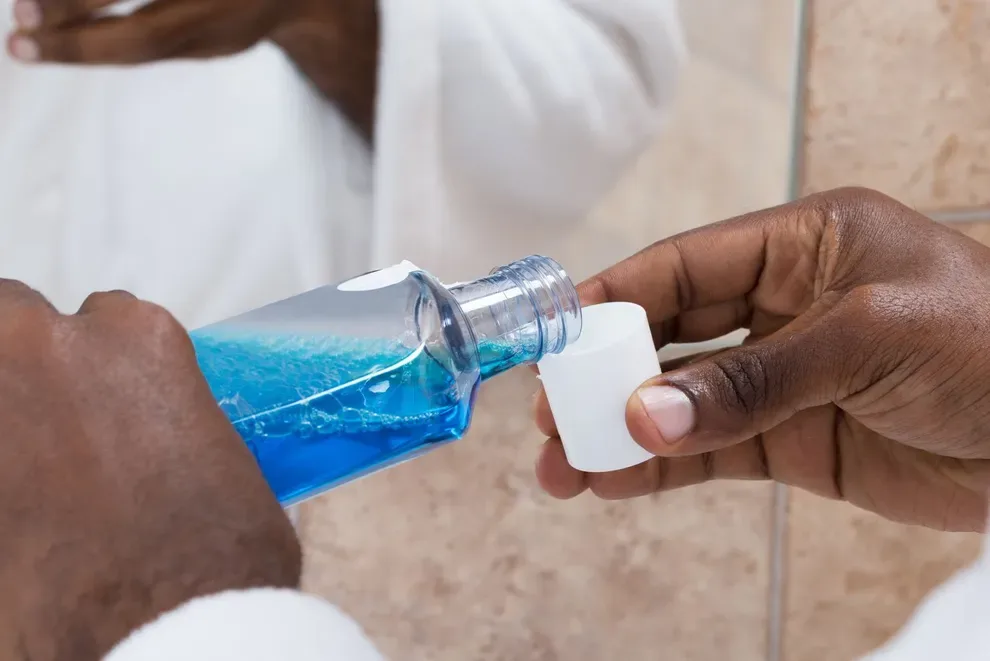Mouthwash for a Receding Gumline - How Much Does It Help?

Table of Contents
- What Are The Top Brands
- How Effective is Mouthwash
- Best Mouthwash for Receding Gums
- DIY Mouthwash for Receding Gums
- Other Treatment Options
- References
Mouthwash doesn’t address the underlying causes of receding gums, but it does stop bacteria and plaque buildup, which are responsible for gum disease. Gum recession, a condition in which the margin of the gum tissue surrounding the teeth begins to wear away, often stems from various forms of gum disease and poor oral hygiene.
In addition to gum diseases, the underlying causes of receding gums often include the following:
The most common cause of gum disease stems from poor oral hygiene. Not brushing and flossing regularly allows plaque to build up and then harden into deposits called tartar, which is infinitely harder to deal with at home. Your dentist monitors tartar buildup during your monthly visits.
Using hard bristles and brushing too hard will cause the enamel on your teeth to wear out, encouraging gum recession.
Severe grinding and clenching of teeth can put enough pressure on the gums to make them recede.
Smoking increases your likelihood of getting gum disease.
Severe cases of periodontitis can cause the gum to pull away and develop pockets of space where infections thrive. Gum diseases like this cause the most severe forms of receding gums.
What Are The Top Brands?
Corsodyl
Corsodyl is a well-known manufacturer of toothpaste, floss, and mouthwashes. The Corsodyl mouthwash helps with bleeding gums as well as recession, and it prevents gum disease. It is the go-to brand for many people with gum recession.Corsodyl contains an active ingredient called chlorhexidine digluconate, an antiseptic that kills bacteria that aren’t layered onto the teeth.
Listerine
Listerine is said to kill up to 97% of bacteria and has a renowned fresh, minty taste. This is a good option if you’re looking for a bit of variety since you’ll typically find several types available.
This brand makes mouthwash specifically for gum disease, which is sold in the UK — Listerine Advanced Defence Gum Treatment. Made specifically for gum problems, it removes plaque, maintains gum health, and gives you minty fresh breath.
The initial sign of gum recession is usually tooth sensitivity, or you may notice a tooth seems longer than normal.
How Effective is Mouthwash?
Corsodyl uses an antiseptic (chlorhexidine digluconate) to kill plaque and stop bacterial buildup, a measure that can stop the development of receding gums. Aside from aiding in the prevention and treatment of gum disease, the antiseptic fights oral thrush and mouth ulcers. It can also be used for partially erupted teeth (wisdom teeth especially).
Corsodyl might cause temporary brown stains around your gum line and a tingling sensation on your tongue and cheeks. It can also be deactivated by sodium lauryl sulfate, an ingredient found in some toothpaste. For maximum effectiveness, your dentist may recommend another toothpaste or advise you not to brush your teeth for at least 30 minutes after using Corsodyl.
Listerine no longer includes its customary essential oil formula in its mouthwash. Instead, the brand’s gum treatment mouthwash has an ingredient called Ethyl Lauroyl Arginate HC, an antimicrobial that’s been used to stop plaque buildup in packaged foods for years.
Listerine stops plaque buildup, thereby preventing the tooth irritation that leads to gum recession. However, it also contains alcohol, and so it might cause an unpleasant burning sensation that lasts temporarily.
Listerine is said to be effective in as little as two weeks when used twice a day. However, neither it nor Corsodyl should be used in lieu of mechanical brushing since they mostly kill the bacteria floating around your mouth and not the ones embedded on the surface of your teeth.
The best recommendation is to seek professional advice from a dentist or oral hygienist first. Neither of these mouthwashes addresses the underlying cause of your receding gums. They are only meant to serve as supplementary aids for gum recession, which must be established by a health professional first.
What Is The Best Mouthwash for Receding Gums?
While all mouthwashes with antimicrobial and antiseptic properties will help reduce bacteria and plaque in the mouth to promote oral and gum health, some products are formulated specifically to treat gums and may help with issues like receding gums.
Top mouthwashes for gums include the following:
Colgate claims this highly rated mint-flavored mouthwash reduces plaque along the gum line and between teeth, killing 99% of germs it comes in contact with and providing 12-hour protection against plaque-forming bacteria. The formula contains cetylpyridinium chloride (CPC), a popular anti-bacterial agent.
It costs about $17 for a pack of two 16.9 fl. oz. bottles on Amazon.
Another top pick is this minty multitasker, which also features CPC for battling bacteria and plaque. Crest claims this alcohol-free formula prevents gingivitis, kills 99% of germs, and freshens breath — all at an affordable price point.
Although it’s on the pricey side, this natural formula features a unique blend of herbs and essential oils to reduce gum inflammation and plaque, including red thyme, echinacea, and lavender.
Listerine’s a trusted name in oral care, and they claim this spearmint-flavored antiseptic mouthwash is 99% naturally derived, clinically proven to reduce plaque and gingivitis, and will deliver healthier gums in just three weeks (compared to brushing alone).
DIY Mouthwash for Receding Gums
If you prefer the natural or do-it-yourself route, there are plenty of safe mouthwash recipes to make at home.
The most basic recipes use distilled water, baking soda, and sea salt and/or essential oils (often peppermint or tea tree oil, which have antimicrobial properties).
Baking soda is antibacterial and can bring relief to tender gums. It also can help in reducing inflammation in the mouth.
Talk to your dentist before trying any new rinses and be wary of any recipes that call for alcohol in the ingredients. While alcohol is used in many over-the-counter mouthwashes, it can cause dry mouth, which can actually harm the gums and encourage plaque and bacteria.
Some variations of DIY mouthwash recipes include the following:
Calendula extract, peppermint leaf or sage tea, and white oak bark extract
Aloe vera and/or xylitol
Apple cider vinegar or rosemary
Other Treatment Options for Receding Gums
Mild cases of gum recession can be treated by this two-part procedure, which involves clearing out hardened tartar below the gum line and planing (smoothening) the roots of your teeth to encourage gum reattachment. The procedure is nonsurgical, but the dentist may offer a local anesthetic beforehand.
Following the procedure, you can expect some redness, swelling, and soreness. The dentist may recommend Corsodyl mouthwash as a short course antimicrobial afterward.
More severe cases of gum recession may necessitate the surgical detachment of gum tissue to enable better access to the roots. The gum tissue is folded back during the procedure and then reattached firmly once it’s done.
Regeneration is similar to scaling and planing procedures, but it involves the use of a membrane, graft-tissue or tissue-stimulating protein to encourage natural growth and restoration of damaged bone and tissue once the plaque and tartar buildup is cleared away.
Gum grafting is a viable measure for gums that have lost significant tissue. The dental surgeon may graft tissue from the roof of your mouth (or the surrounding gums) and use it to cover exposed roots.
